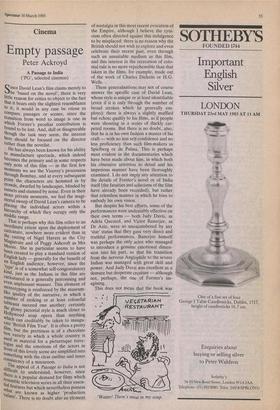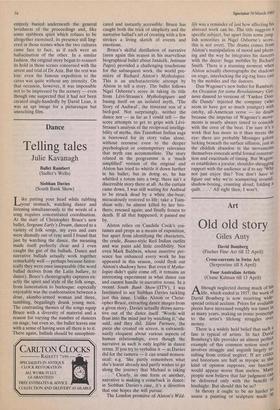Cinema
Empty passage
Peter Ackroyd
Since David Lean's film claims merely to be 'based on the novel', there is very little reason for critics to object to the fact that it bears only the slightest resemblance to it; it would in any case be otiose to compare passages or scenes, since the transition from word to image is one in Which Forster's peculiar contribution is bound to be lost. And, dull or disagreeable though the task may seem, the interest here should be focused on the director rather than the novelist.
He has always been known for his ability to manufacture spectacle, which indeed becomes the primary and in some respects Only note of this film — in the first few moments we see the Viceroy's procession through Bombay, and at every subsequent Point the characters are hemmed in by crowds, dwarfed by landscapes, blinded by sunsets and stunned by noise. Even in their More private moments, we feel the magi- sterial sweep of David Lean's camera to be Placing the individual actors within a hierarchy of which they occupy only the middle range.
That is perhaps why this film relies to an inordinate extent upon the deployment of caricature, nowhere more evident than in the casting of Nigel Havers as the City I'vfagistrate and of Peggy Ashcroft as Mrs 1N;toore. She in particular seems to have ,,een created to play a standard version of Lnglish lady — generally for the benefit of an English audience, however, since the iltYPe' is of a somewhat self-congratulatory just as the Indians in this film are caricatured in a generally patronising and even unpleasant inanner. This element of s,.tereotyping is reinforced by the museum- 1e quality of the narrative, in which a nurnber of striking or at least colourful tableaux succeed one another; certainly tille glossy pictorial style is much closer to °11Ywood soap opera than anything ;which can creditably be taken to inaugu- ate 'British Film Year'. It is often a pretty , but the prettiness is of a chocolate "°)t variety in which a whole country is 111 sed as material for a picturesque trave- ccigue and the emotions of the actors in 'ront of this lovely scene are simplified into scimething with the clear outline and inner consistency of a macaroon. The appeal of A Passage to India is not tuh'fficult to understand, however, since , ere is a popular demand for films which '..esernble television series in all their essen- tial features but which nevertheless possess nat are known as higher 'production allies'. There is no doubt also an element
of nostalgia in this most recent evocation of the Empire, although I believe the cyni- cism often directed against this indulgence to be misplaced: there is no reason why the
British should not wish to explore and even FOUNDED 1744 celebrate their recent past, even through such an unsuitable medium as this film, and this interest in the recreation of colo- nial rule is no more reprehensible than that taken in the films, for example, made out of the work of Charles Dickens or H.G. Wells.
But despite his best efforts, some of the performances were undeniably effective on their own terms — both Judy Davis, as Adela Quested, and Victor Banerjee, as Dr Aziz, were so unencumbered by any 'star' status that they gave very direct and truthful performances. Banerjee himself was perhaps the only actor who managed to introduce a genuine emotional dimen- sion into his part, so that his transition from the nervous Anglophile to the severe Indian was managed with great skill and power. And Judy Davis was excellent as a demure but desperate creature — although not, perhaps, the one of Forster's im- agining.
This does not mean that the book was 'Waiter! There's meat in my soup.' entirely buried underneath the general lavishness of the proceedings and, like some stubborn spirit which refuses to be altogether exorcised, its presence still ling- ered in those scenes when the two cultures came face to face, as if each were an hallucination of the other. In a similar fashion, the original story began to reassert its hold in those scenes concerned with the arrest and trial of Dr Aziz. But the rest was lost: even the famous expedition to the caves was quite without any intensity. On that occasion, however, it was impossible not to be impressed by the scenery — even though one suspected that it had not been created single-handedly by David Lean, it was an apt image for a picturesque but unexciting film.















































 Previous page
Previous page